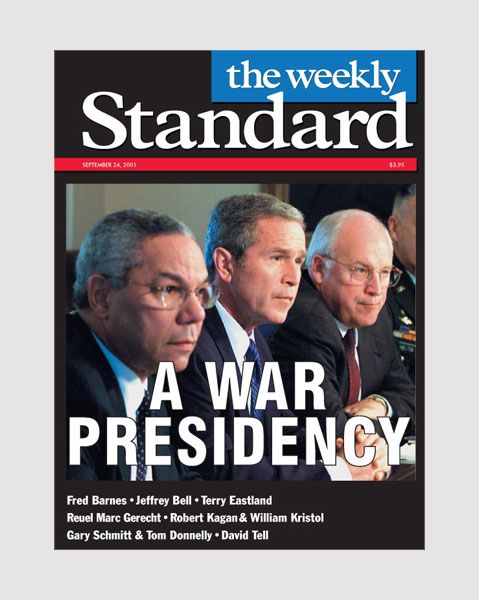
Accounts of the demise of The Weekly Standard magazine (formally announced by its publisher today after weeks of rumors) have typically focused on its very recent opposition to Donald Trump, or its identification with the war-hawk internationalist creed known as “neoconservatism,” or the erratic punditry of its longtime editor-in-chief William Kristol. From the perspective of the magazine’s entire 23-year history, though, I’d derive a different if parallel story. TWS was born in service to the Republican Party and eventually fell too far out of step with it to survive with a coherent mission.
It was no accident that the magazine was founded in 1995, the year the “Republican Revolution” led by Newt Gingrich arrived in Washington. It proclaimed confidently in its inaugural issue that it intended to both speak for and guide that revolution (the cover featured a cartoon of Newt Gingrich rappelling into Washington firing a machine gun). So from the get-go, TWS was no ideological watchdog keeping a wary distance from the GOP, like its older cousin National Review. It was a straightforward partisan mag. It suffered with the party during its defeats and celebrated with the party during its victories, however dubious (the issue after Bill Clinton’s impeachment by the House had the cover headline “Their Finest Hour”). And when its chief figures had a factional impulse, they were careful to couch it in the language of party unity.
A good example was a 1999 piece by David Brooks (yes, that David Brooks) casting both John McCain (his and Bill Kristol’s candidate) and George W. Bush (the candidate of magazine co-founder Fred Barnes) as espousing something he called “one nation conservatism.” When Bush took office and subsequently adopted McCain’s aggressive views on spreading democracy by American military might, the Standard could barely contain its excitement, depicting Bush as “the liberator” of Iraq, a sort of global colossus who had forever consigned antiwar wimps to the ash heap of history.
This is the period in which the magazine earned its reputation as the homeland of neocons and as cheerleaders for the Iraq War that neocons in the administration largely designed and guided. The word “sycophantic” was frequently appropriate for its attitude toward its heroes. As it happens, there was too little dissent over Iraq in the Republican Party at that time to test whether party or principle was more important to the editors and writers at TWS. They were predictably happy that their old flame John McCain won the GOP nomination to succeed Bush, and had no problems with Mitt Romney’s highly conventional outlook when he became party leader in 2012. So it was rather abrupt when in May of 2016 Bill Kristol quoted John F. Kennedy as saying “Sometimes party loyalty demands too much”:
I have always voted for the Republican presidential candidate. From Richard Nixon and Gerald Ford to Ronald Reagan (twice) and George H. W. Bush (twice) and Bob Dole, from George W. Bush (twice) to John McCain and Mitt Romney—I’ve checked the box next to those eight names on all 11 occasions I’ve had the chance. About half the time, I’ve voted for someone else in the primary. But even in those cases I never hesitated before supporting the Republican nominee in the general election.
I regret none of those votes. I believe in retrospect, as I believed at the time, that in every case these men would have pursued policies better for the country than their opponents would have, and I believe now, as I did then, that in almost every case the Republican nominee was also superior to his opponent in terms of character and temperament and judgment.
Kristol then said he could support neither Donald Trump nor Hillary Clinton, and called for an entirely futile course of action: “[to] [r]ecruit and support an independent candidate.”
It wasn’t Kristol’s #NeverTrump posture that made him stand out and that so infuriated so many people. It’s that he did so from the point of view of the consummate partisan, which implicitly suggested that the Republicans who went along — reluctantly or happily — with Trump were the true apostates. And as Trump won, took office, and gave conventional Republicans their reward via tax cuts, Supreme Court appointments, higher defense spending, and other policy concessions, Kristol and his comrades stood out even more for not finding a way to keep their mouths shut and close ranks.
There are conflicting reports circulating as to whether TWS’s closing was primarily attributable to declining readership, conflicts with its current ownership (which is already promoting an expansion of the Washington Examiner, its other conservative journalistic property — decidedly less anti-Trump), or some other, undisclosed cause. I have no idea where the truth lies. While not a fan of the magazine’s often tendentious politics in the past, I do think it has published some intelligent and entertaining writers and perspectives over the years, and a conservative media landscape with no room for TWS is simply making more room for the deranged Breitbart News and the vast, mendacious Fox enterprise.
Still, it’s hard to view the extinction of The Weekly Standard as an injustice. It lived by the sword of reflexive partisanship, and now it dies by the same instrument.
This post was updated and republished after The Weekly Standard’s demise was confirmed by its publisher.






























